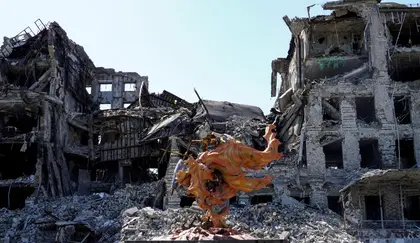As I was driving along the Zhytomyr highway recently, I passed two supermarkets that were destroyed and looted by the Russian army during the offensive against Kyiv in the spring of 2022. They are now both restored and working.
The Zhytomyr highway – the main road from Kyiv to the west of Ukraine – was repaired in the fall and is now easy to drive along. Unfortunately, that cannot be said for secondary roads in the region. Some are almost impassable in anything other than a jeep or a tank.
JOIN US ON TELEGRAM
Follow our coverage of the war on the @Kyivpost_official.
The administration of the occupied Donbas recently boasted about the quality of their roads. They proudly explained how these roads had been repaired. Their explanations made me feel uneasy. I was reminded of how, in the 1990s, the American horror movies that appeared in cinemas in newly independent Ukraine failed at the box office. These movies did not attract viewers because Hollywood horror looked like a set of ridiculous misunderstandings compared to the real Soviet-era horror experienced by the inhabitants of Ukraine. Deportations, the Holodomor of 1932-1933, the Holocaust, the Gulag. All this historical experience set the standard for Ukrainians as far as horror is concerned. As an entertainment genre, it aroused little interest among them.
“Construction waste,” soaked in the blood of murdered Ukrainians, now forms the roads along which private cars, public buses, and Russian military vehicles travel.
The details of the road engineering in Donetsk given in Russian reports, remind me of those Soviet horrors. The roads in the Donbas, we are told, were repaired using more than one hundred thousand tons of “construction waste” from Mariupol. This means that Russia crushed and removed from the ruined city the debris of apartment blocks and private houses – all destroyed by Russian missiles and artillery – along with the bodies, or fragments of the bodies, of residents who had died in their homes. This “construction waste,” soaked in the blood of murdered Ukrainians, now forms the roads along which private cars, public buses, and Russian military vehicles travel.

Putin Says Again He‘s Ready for Compromise - On His Terms, Of Course
For parents in the rest of Ukraine dealing with horror and fear – their own and their children’s – is a daily preoccupation. Parents are concerned about how the experience of war affects the psyche of children and their perception of life. Parents want to know how best to talk to their children about war and death, how to calm their nerves during shelling, and how to distract them from feelings of fear and anxiety.
Several children’s books about this have appeared in bookstores and are selling well. No less in demand are newspaper and magazine columns written by child psychologists. Social networks are full of messages from parents about what they have learned. They want to share the information and it occurs to me that it is useful knowledge for all adults in Ukraine today.
For example, when you are in a bomb shelter with a child and there explosion outside, you need to make sure that the child is breathing normally. There are games you can play to help, like blowing soap bubbles or getting the child to make the sound of air being let out of a balloon.
If the explosions are very close and loud, it is important to maintain tactile contact with the child: massage the child’s ears and stroke their cheeks. From time to time, you need to ask the child to pretend to be very tired – to give a big yawn and stretch.
Once the alarm is over, be sure to praise the child for their courage. Tell them: “It’s over! We’re safe! Thank you for being so brave and strong! We heard so many explosions, but we made it through! We weren’t scared!”
After these words, you need to invite the child to suggest what they want to do in the hours following the air raid. Making plans for the future is the best way to distract children from war.
For adults, thinking about the future is complicated. We may have plans for this year, but we know that there is no guarantee they will be fulfilled. When I think about the future, I look to the sky. Over Kyiv these days the sky is gray-blue. Sometimes snow falls onto the streets and there are the usual noises of the city and the cawing of crows.
The crow is, in fact, the unofficial bird symbol of the city. Crows do not fly away for the winter. They patronize the city all year round. Their cawing is not a pleasant sound. In peacetime, it seemed that the crows were warning each other about something with their cries. Now they seem to warn the residents of Kyiv.
A couple of days ago, several crows on Lviv Square screamed so loudly and excitedly that I stopped with other passersby and looked up for a long time at the crowns of the bare trees, from where the large black birds were making their raucous speeches.
In the past, these crows would have irritated me, but now I listen to them with pleasure. They distract me for a short time from the reality in which I live, from the reality in which all of Ukraine lives today.
I’m probably also like a child, waiting for someone to tell me: “It’s over! We’re safe! Thank you for being so brave and strong! We heard so many explosions, but we made it through! We weren’t scared!”
The views expressed in this opinion article are the author’s and not necessarily those of Kyiv Post.
You can also highlight the text and press Ctrl + Enter






